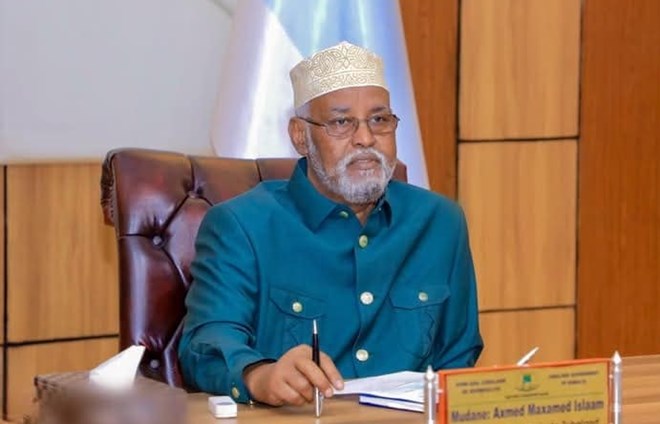
Friday November 22, 2024

FILE - Jubaland President Ahmed Mohamed Islam, commonly known as Ahmed Madobe, presiding over a regional government meeting in Kismayo. Madobe, a central figure in Somalia's federal-state relations, has led Jubaland since 2013
Mogadishu (HOL) — Somalia’s Federal Government has rejected the ongoing elections in Jubaland, accusing the region’s leadership of manipulating the process to maintain its grip on power. The leadership elections, held in the southern port city of Kismayo, saw Jubaland’s legislature re-elect close allies of President Ahmed Madobe, who is widely expected to retain his presidency in a vote scheduled for November 25.
Minister of Petroleum and Mineral Resources Abdirizak Omar Mohamed labelled the process a “theatrical project” and said Mogadishu would not recognize its outcome. “The Federal Government is committed to transitioning Somalia away from clan-based indirect elections to a one-person, one-vote system. We cannot endorse the results of this theatrical project, which violates the principles of inclusive governance,” he said.
Prime Minister Hamza Abdi Barre’s administration previously dismissed the electoral process as unconstitutional, accusing Madobe of consolidating power and undermining efforts to transition Somalia toward universal suffrage. “Jubaland’s actions violate commitments made during the National Consultative Council (NCC) to establish a unified electoral framework,” Barre said, reiterating the Federal Government’s push for a one-person, one-vote system.
Tensions between Mogadishu and Jubaland have escalated in recent months, with the Federal Government accusing Ahmed Madobe’s administration of sidelining opposition figures and ignoring calls for transparency. Prime Minister Hamza Abdi Barre’s government has criticized the Jubaland electoral commission for acting unilaterally and completing the selection of parliamentary members and leadership positions without broader consultation.
Jubaland’s newly formed parliament elected its speaker and two deputies on Thursday, marking another step toward Monday’s presidential election. The Federal Government, however, views the process as illegitimate, arguing it undermines Somalia’s broader push for electoral reforms.
Ahmed Madobe, who has led Jubaland since 2013, remains a divisive figure in Somali politics. While his supporters credit him with stabilizing a region plagued by insecurity and countering the Al-Shabaab insurgency, critics argue his administration perpetuates division and undermines Somalia’s federal system.
The Federal Government views direct elections as essential for Somalia’s democratic progress. President Hassan Sheikh Mohamud has pushed for reforms to replace the clan-based, indirect electoral system, which critics say fosters political fragmentation and entrenches local power brokers. However, Jubaland, citing its constitutional autonomy, has rejected these reforms, arguing they infringe on regional governance.
Analysts say Madobe’s likely re-election could deepen the rift between Jubaland and Mogadishu, further complicating efforts to unify the country’s federal member states under a cohesive governance framework.
Jubaland’s strategic location along the Kenyan border and its significance in regional security make its political stability crucial for Somalia’s development.
Somalia’s international partners, including the United Nations, African Union, and European Union, have called for urgent dialogue to address the growing rift. In a joint statement, they urged Jubaland to re-engage with the NCC, a forum designed to foster collaboration between federal and regional governments.